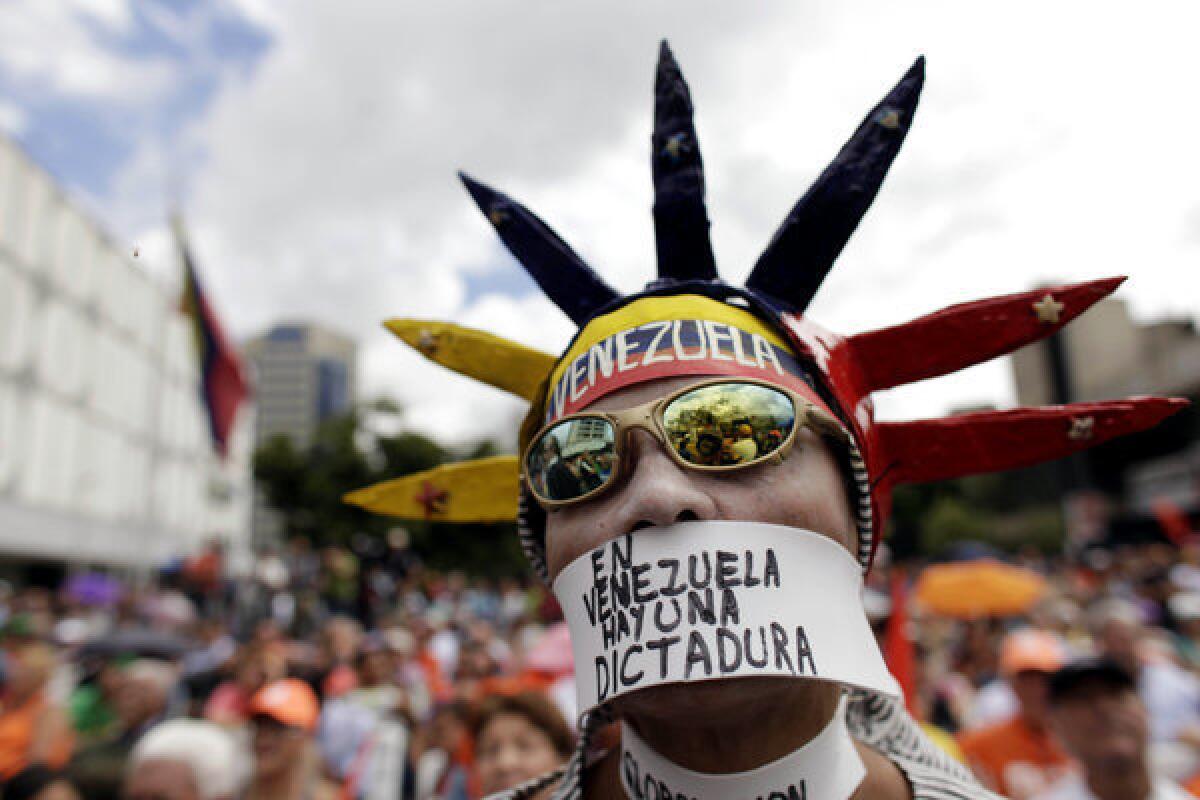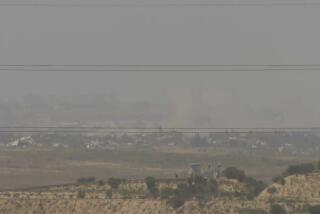Rights groups criticize Venezuela sanctions on TV station

- Share via
CARACAS, Venezuela — Press freedom advocates Saturday came down hard on the Venezuelan government’s sanctions this week against Globovision, the country’s lone remaining opposition TV station, in what some described as officialdom’s latest attempt to squelch dissent and free speech.
The New York-based Human Rights Watch condemned the government’s order that Globovision cease transmitting video spots questioning the constitutionality of the government’s decision to grant an open-ended medical leave of absence to ailing President Hugo Chavez, who is being treated in Cuba following cancer surgery. He was to have been inaugurated Thursday for a fourth term, but the oath-taking has been put on indefinite hold.
“Venezuela should end censorship and intimidation of media that challenge the official line regarding President Hugo Chavez’s health and inauguration,” Jose Miguel Vivanco, director of the group, said in a statement.
Human Rights Watch followed statements by the Committee to Protect Journalists, the Inter-American Press Assn. and other groups in criticizing the government for taking action against Globovision under the Social Responsibility in Radio, Television and Electronic Media Law. In administering sanctions, the Conatel regulatory agency accused the station of “sowing hatred and division.”
“This is an absurd measure that attempts to silence debate over a topic of evident interest to the public,” Committee to Protect Journalists senior program director Carlos Lauria said Saturday in an emailed comment. “It’s a clear signal that Venezuelan authorities are adding pressure on private media to repress dissent.”
Chavez has not been seen or heard from since his Dec. 11 surgery. Amid mounting concerns he is permanently incapacitated or moribund, Globovision’s spots highlighted constitutional guidelines calling for a temporary transfer of power to the National Assembly until Chavez can take the oath of office, or for new presidential elections to be held if he is permanently incapacitated.
Vice President Nicolas Maduro has taken over the reins of government pending Chavez’s recovery or new elections, a move whose constitutionality has also been questioned.
Conatel took action after National Assembly President Diosdado Cabello and Energy Minister Rafael Ramirez publicly called for Globovision to be penalized.
The Conatel sanctions could lead to a three-day suspension of broadcasting or a fine amounting to 10% of the station’s annual revenue, said Marcelino Bisbal, director of graduate media studies at Andres Bello Catholic University in Caracas. He said the station has a relatively small audience, broadcasting in only three cities, but is significant in that it is Venezuela’s last remaining opposition TV broadcaster.
“This is more than routine harassment. I think it’s a real threat and a message being sent by the vice president to the Chavista base that he will continue to radicalize the revolution and discourse in Chavez’s absence,” Bisbal said in an interview, adding that the station is at risk of losing its broadcast license in 2015 when it comes up for renewal.
In 2007, the Chavez government shut down RCTV, then the most potent anti-Chavez TV station, by refusing to grant its owners a license renewal. The closure spawned nationwide protests and the birth of a student protest movement, but Chavez refused to reverse the decision.
The action is the eighth taken by the Chavez regime against Globovision. In June, the station paid a $2.1-million fine “under protest” that the government levied for its 2011 coverage of a prison riot near Caracas in which it allegedly “incited violence.” The station maintained it was merely practicing good journalism.
Over his 14 years in power, Chavez has followed a strategy of ever-increasing government control over news media, according to Andres Canizalez, a media researcher at Andres Bello Catholic University. While shutting down more than 50 independent radio and TV stations, he has set up a government media chain that now numbers six TV and 100 radio stations.
“Over the years, the Chavez government has built a legal regime that allows it to censor and punish its critics in clear violation of international norms,” Vivanco of Human Rights Watch said in his statement.
ALSO:
Saudi king chooses women for spots on advisory council
French agent, soldier reported killed in botched raid in Somalia
Year after wreck, salvage of Costa Concordia falls behind schedule
More to Read
Sign up for Essential California
The most important California stories and recommendations in your inbox every morning.
You may occasionally receive promotional content from the Los Angeles Times.












